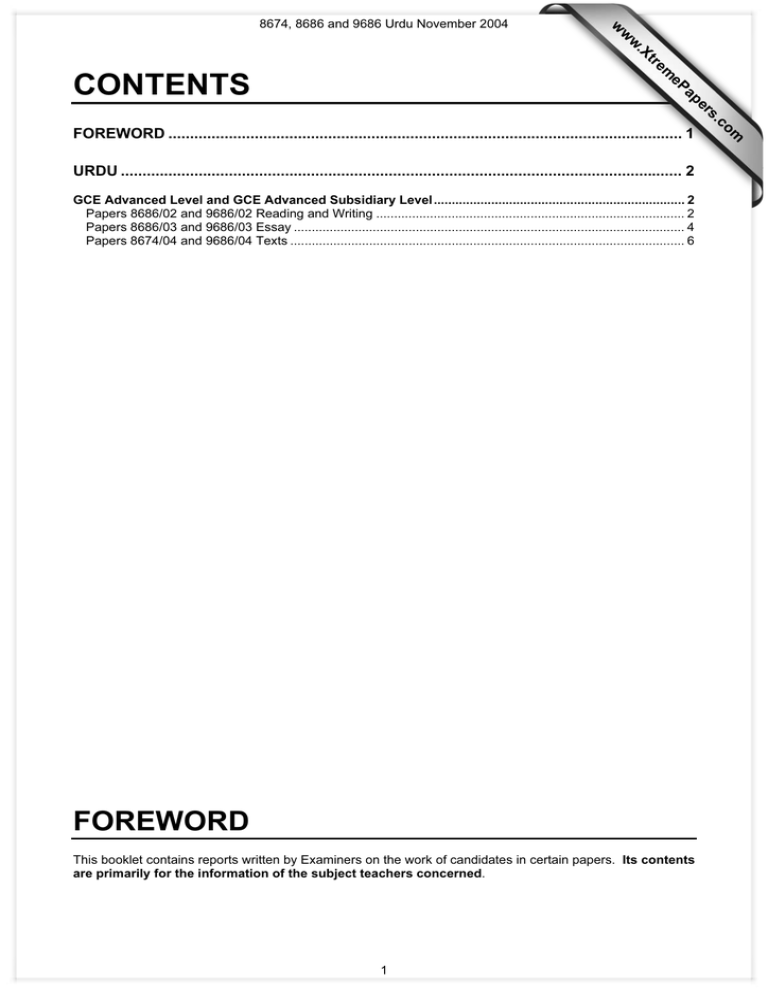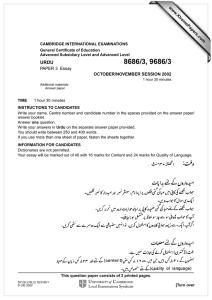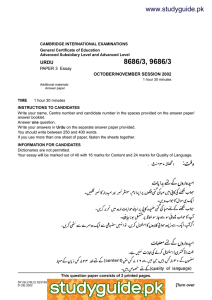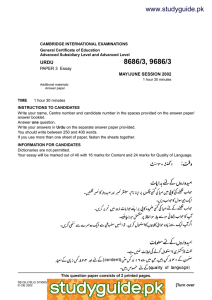CONTENTS www.XtremePapers.com
advertisement

w w 8674, 8686 and 9686 Urdu November 2004 m e tr .X w ap eP CONTENTS URDU .................................................................................................................................. 2 GCE Advanced Level and GCE Advanced Subsidiary Level ...................................................................... 2 Papers 8686/02 and 9686/02 Reading and Writing ...................................................................................... 2 Papers 8686/03 and 9686/03 Essay ............................................................................................................. 4 Papers 8674/04 and 9686/04 Texts .............................................................................................................. 6 FOREWORD This booklet contains reports written by Examiners on the work of candidates in certain papers. Its contents are primarily for the information of the subject teachers concerned. 1 om .c s er FOREWORD ....................................................................................................................... 1 8674, 8686 and 9686 Urdu November 2004 URDU GCE Advanced Level and GCE Advanced Subsidiary Level Papers 8686/02 and 9686/02 Reading and Writing General comments This paper is designed to test candidates’ understanding of written Urdu and their ability to write accurate responses to text-based questions and their ability to write accurate and concise Urdu in response to given stimuli. Overall, the performance of candidates was good, with a high proportion of excellent scripts. The problem for most candidates is not writing Urdu but answering the questions in accordance with the given rubrics. Comments on specific questions Section 1 Question 1 This required candidates to write their own sentences illustrating clearly the meanings of words taken from the first text. This was mostly well done, with most candidates scoring at least 4 out of 5 marks. Where candidates lost marks was either if they copied a sentence from the text, such as: which is almost identical to the sentence in the text, or wrote a sentence like: which does not illustrate the meaning. On the other hand a sentence like: does illustrate the meaning. Some candidates changed the grammatical form of the word, for example: get a mark. became . This did not Question 2 This question required candidates to give the opposites of five words. Most candidates scored 4 or more marks. Only one word caused any significant difficulty, this was opposites such as but was not accepted. 2 . There are several appropriate 8674, 8686 and 9686 Urdu November 2004 Question 3 The five parts to this question were based on the text given. The text was allegorical in nature, and was apparently about bananas but the underlying theme was advertising. Weaker candidates were able to understand at least the literal meaning of the text, but not the underlying theme, whereas the stronger candidates were well able to extract the underlying meaning and wrote appropriate and well written responses. Candidates are expected to write concise answers in their own words. Many answers were lifted directly from the text with minimal alteration, others were too long, either more than six lines, or in some cases well over 100 words. All these questions can be answered simply and concisely in at most two well constructed sentences. Taking (i) as an example, the question was: Simply expressed, the reply should be something close to: In (ii) the question asks candidates to write about the importance of bananas for ordinary people, This example is concise but gives every necessary detail to gain three marks. (The marks awarded for each question is an indication of how much information is required in the answer.) In (iii) few candidates scored full marks because many simply copied lines 10 – 12 directly from the text. In (iv) the majority of candidates understood the meaning of , ‘negative’, but many wrote mistakenly about the positive aspects of bananas and therefore did not get a mark for this question. (v) asked candidates to explain why the writer had written: ‘This advertisement makes you think, doesn’t it.’. Very few candidates received full marks for this question. Many candidates were unable to explain the allegorical nature of the text which was an advert for the Times newspaper. Most candidates simply wrote that there were unexpected aspects to bananas which people do not normally think about. Five marks were available in this question for overall linguistic standard. Most candidates gained four marks and some got full marks. While a high proportion of candidates could write excellent Urdu, if they did not demonstrate their understanding of the text in their own words they could not receive good marks for their use of language. Section 2 Question 4 As in Question 3 candidates were asked to write responses to five questions based on the text given. The passage was explicitly about advertising. Most candidates displayed more than adequate comprehension of the text but some candidates did not follow the rubrics correctly. A good example here is in (i) which asked: ‘What is the essential purpose of advertising?’ A concise response was: To make people spend money buying things they did not think they needed. Most candidates wrote good responses to this question. 3 8674, 8686 and 9686 Urdu November 2004 (ii) asked about the techniques used to make advertisements effective. This question was well done by most candidates. An example of a good response was: (iii) was quite straightforward and was well answered by most candidates. (iv) asked for two negative aspects of advertising. It depended on understanding the word correctly. Most candidates wrote well, mentioning the use of people’s psychological weakness, unnecessary expenditure and/or visual pollution of the environment. The last question of this section asked ‘Why has the author written that ‘We in Britain are to some extent fortunate.’?’ The required response should have included the points: there are no advertisements on two channels so there is no interruption of interesting programmes, and that many adverts are very interesting and well made because more money is spent on them than on the television programmes. Again five marks were available for linguistic accuracy. Most candidates scored three or more marks because a good proportion could write excellent Urdu, however those who did not use their own language in their responses, could not receive full marks for language. Question 5 The quality of responses to this question was in some cases excellent, and the majority of candidates performed at least adequately. In the first task candidates were asked to discuss how much the advertising industry interferes in our lives. Answers needed to refer to both passages. Some candidates merely summarised the two passages, preventing them from achieving high marks. In the second task candidates were asked to give their opinion on whether advertisements during children’s programmes should be restricted. Most candidates clearly understood the tasks and were able to write appropriate responses. The opinions that were offered on the second topic were very well expressed and cogently argued. Many candidates wrote more than the 140 words overall that are stated in the rubric and wrote well over that for each task, reducing their ability to score the highest marks. Conclusion While the overall performance was good, with most candidates displaying very good comprehension skills and good writing skills, it would have been further improved by stricter observance to the rubrics. Papers 8686/03 and 9686/03 Essay General comments The essay component is marked out of 40 with 24 marks available for quality of language and 16 for content. The majority of essays are at least competently written, although the weakest do contain significant spelling errors and a restricted vocabulary and poor syntax, serious language errors are rare, particularly in the case of Pakistani Centres. The standard of language used was nearly always adequate at this level and most marks are lost in the layout, organisation and content of the essays. There were very few candidates whose Urdu was not up to A Level standard, and some candidates produced beautifully and accurately written Urdu. Most candidates managed to write around the prescribed number of words (250-400), although some essays were well over 600 words long. At Advanced Level the ability to both follow rubrics and write concisely is important and candidates who did write much in excess of the limit do, in effect, penalise themselves because they cannot complete their essay with an appropriate summarising paragraph within the prescribed limits. 4 8674, 8686 and 9686 Urdu November 2004 Planning, structure and argument are essential components of essay writing, but it should be noted that it is not necessary for candidates to write planning notes, although many candidates did and it seems indicative that many of those who do tend to be ones who go on to write well planned compositions. As usual, there were six essay titles. By far the most popular title this year was: “The younger generation can’t learn anything from their elders.” which comprised nearly 50% of compositions, unfortunately, despite some satisfactory responses, ones that stood out were few and far between. In most cases the candidates put the position of their generation as having moved away and above their elders, who did not listen to them, or more tellingly, could not understand them. What made the good ones stand out was balance, involving seeing the ‘generation gap’ from their elders’ point of view and describing their experience and wisdom as being vital in ensuring the development of a mature person. The next most popular topic was: “How can unemployment be controlled?” This essay did produce some excellent responses, but rather too many candidates spent too much time and space on the causes of unemployment, giving themselves little scope to enlarge on the ways of reducing it, which were often vague and sketchy. ‘The government should do something, open more schools and factories,’ etc. At this level it is expected that more detailed responses should be given, such as ‘providing technical education in rural areas’ and ‘increasing public works for improving the environment’ and the like. The third most popular title was: “The effect of Hindi films on Pakistani Culture” This title produced some very good essays; the topic was clearly something that was an important part of candidates’ lives, and it showed in their compositions. Some of the better ones demonstrated a mature understanding of the issues, explaining the way that films introduced Indian or ‘Hindu’ customs, traditions and ideas into a Muslim country, and that young people especially were not clear what was and what was not Islamic. Love and romance was deemed offensive by some. They also mentioned the introduction of Hindi words in to young peoples’ language. While nearly all essays took the point of view that the effect was negative, one or two outstanding ones focused on the positive aspects in that most Hindi films presented the benefits of a strong joint family system. Next in popularity came: “The effect of western foods on local cuisine.” Although the responses were mostly adequate, by and large this topic was not brilliantly written. There were serious misconceptions as to the health-giving virtues of burgers and other western ‘fast foods’, which some candidates seemed to assume that all westerners eat all the time. Relatively few candidates attempted the other two titles, ‘My enemy’s enemy is my friend’ and ‘Nowadays everybody is equal’. The latter was better attempted than the former, which seemed to produce general discussion on war, especially with reference to the current situation in the middle east, with very few grasping the essence of the title. The former did produce some very good essays, with candidates referring to the notional equality enshrined in Islam or the modern human rights movement and contrasting it with the reality found in Pakistan. 5 8674, 8686 and 9686 Urdu November 2004 Overall The linguistic standard of compositions was good, with only a very few candidates unable to write Urdu sufficiently accurately or coherently to score good marks. It is the use of a wide range of structures and appropriate lexis that lifts an ordinary essay above the rest and there were some candidates who wrote beautiful Urdu, illustrated with relevant quotes. Papers 8674/04 and 9686/04 Texts General comments Many candidates produced work of a high standard. Those candidates showed that they had studied the relevant books in depth, had considered the specific issues that they raised and communicated their ideas using appropriate vocabulary and phrases. There were, however, candidates whose knowledge and understanding of the books offered were not up to the required standard. These candidates had difficulty putting across essential words and ideas. Many candidates seemed to have relied on text that they had memorised which, in most cases, was irrelevant and unimaginative. There was again evidence that a number of candidates were spending too much time on superfluous, pre-prepared introductions. The key criterion for success is comprehensive knowledge of the texts in terms of both subject matter and style. Candidates should be reminded that the first part of the question requires specific information acquired through detailed knowledge of the books and that the specific questions must be answered. Vague, pre-prepared answers do not gain good marks. Many candidates were able to express their ideas fully and comprehensively in fluent Urdu with good use of idiom. There were many candidates, however, who did not have a sufficiently wide vocabulary or a sound command of basic grammar to express their ideas adequately. Candidates are required to write concise answers to specific questions with explanation, justification and/or discussion as and when appropriate and to stay within the recommended word limit. Many candidates wrote essays that were much longer than the recommended number of words and candidates need to be reminded that long and irrelevant written material that does not specifically answer the question will not gain any marks. Candidates need to practice adjusting the length of their answers to meet the demands of the questions and the mark allocation. In general scripts were well presented, but some caused difficulties in marking because of poor handwriting and general layout. Some candidates crammed their answers into the smallest space possible and then crossed words out and made scribbled corrections, making it very difficult to get a clear picture of their answer. Comments on specific questions Section 1 There were a number of excellent answers in this section. Many candidates, however, merely relied on an explanation of the poem and paid little attention to the poetic beauty of the ‘ghazal’. The first part of the question was usually well answered by those who had read the book thoroughly. The major weakness for many candidates was only having a sketchy knowledge of the text which meant they were unable to answer the second part of the question very well at all. Most questions in this section have two parts and candidates are required to read the whole question carefully and answer each part. Many candidates tackled part (ii) sufficiently, but there were many who did not quote any references from the text in support of their points. 6 8674, 8686 and 9686 Urdu November 2004 Section 2 Most candidates wrote extensively in response to these questions. Candidates who gained the highest marks had read and understood precisely what was required by the question and had used their knowledge of the text appropriately. The main weaknesses lay in candidates relying too much on a simple explanation of the text and not including any critical analysis of the poetry. Part (ii) of this section was generally well done, though the standard of Urdu varied considerably. Some candidates had a high level of linguistic ability showing a good command of idiom and structure enabling them to express their ideas fully and clearly. Weaker candidates were unable to express themselves well in Urdu as they lacked the ability to handle complex structures and showed many weaknesses in grammar. Many answers were marred by inaccuracies and elementary mistakes such as not writing the correct name of the author, faulty genders and errors in the basic word order of simple sentences. 7




